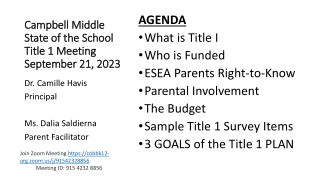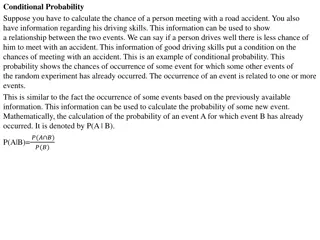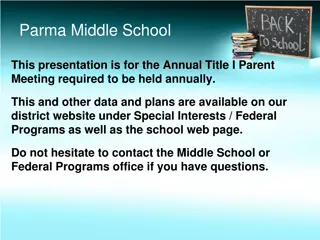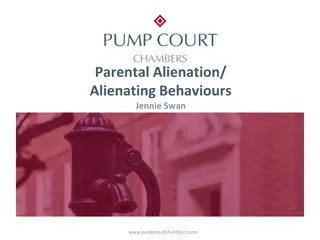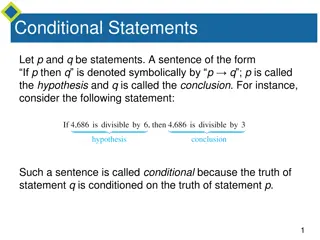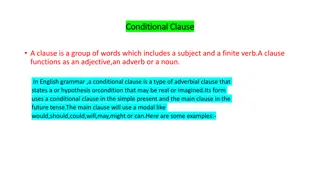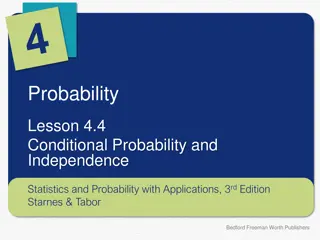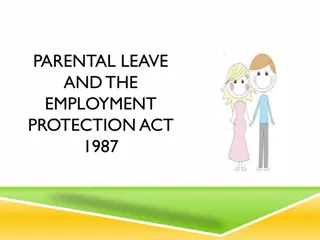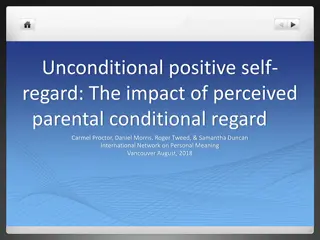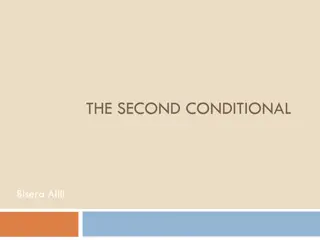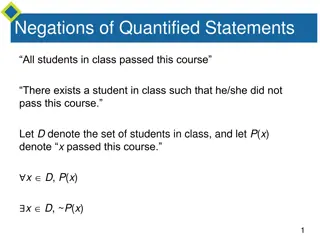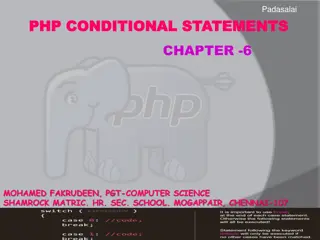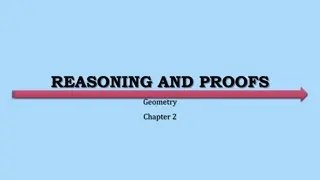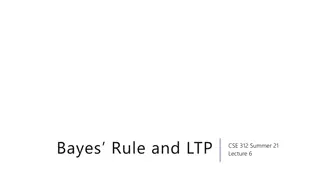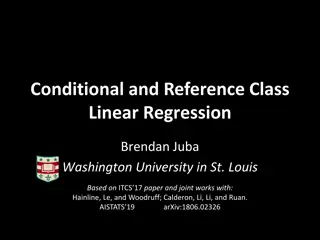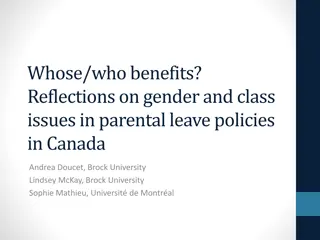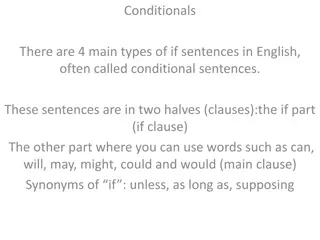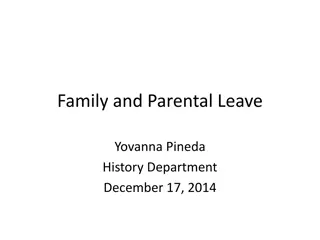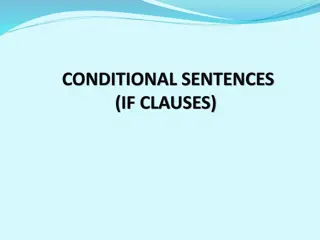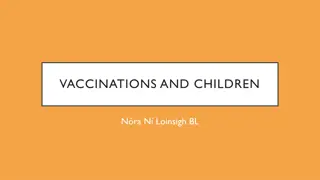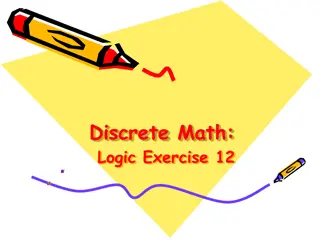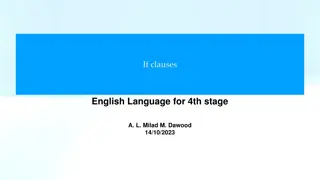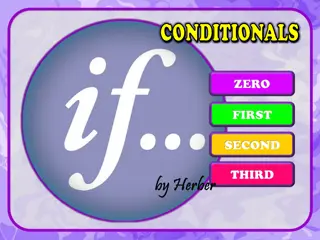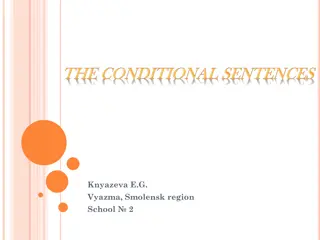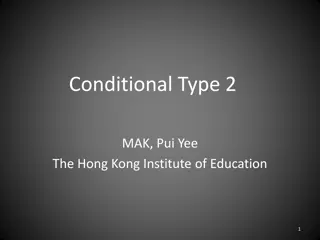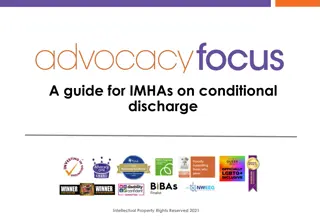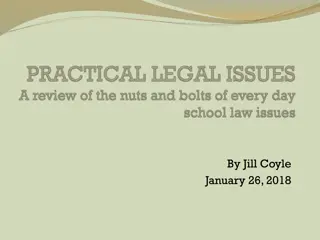Understanding Title I Program and Parental Involvement in Education
Explore the details of the Title I program under ESEA, funding allocations, parental involvement significance, and its impact on student achievement. Learn about school-wide and targeted assistance programs, parental rights to know, and the benefits of strong collaboration between schools, families,
1 views • 48 slides
Enhancing Parental Engagement in Learning: A Toolkit Overview
Explore the importance of engaging parents in their children's learning, why it is crucial for social justice, and the impact of a quality home learning environment. Learn about parental involvement with schools, challenges in teacher training for supporting parental engagement, and the essential el
1 views • 14 slides
Understanding Parental Alienation: Erasing Families and Seeking Solutions
Delve into the complex issue of parental alienation, its impact on families, and explore potential solutions. Join Gene C. Colman, B.A., LL.B., as he sheds light on this important topic in support of the North York Harvest Food Bank. Learn about the emotional nuances, research insights, legal aspect
1 views • 69 slides
Understanding Conditional Probability and Bayes Theorem
Conditional probability relates the likelihood of an event to the occurrence of another event. Theorems such as the Multiplication Theorem and Bayes Theorem provide a framework to calculate probabilities based on prior information. Conditional probability is used to analyze scenarios like the relati
1 views • 5 slides
Parma Middle School
This presentation provides information about the Annual Title I Parent Meeting required by the Every Student Succeeds Act. It covers the purpose of the meeting, school participation in Title I, parental rights, CIP, School-Parent Compact, teacher qualifications, parental involvement, and more. Being
0 views • 17 slides
Understanding Parental Alienation and its Impact on Children - Key Insights
Parental Alienation is a complex issue where one parent psychologically manipulates a child to reject the other parent. This behavior can have severe consequences on the child's well-being and family dynamics. Recognizing the signs of Parental Alienation is crucial for early intervention and ensurin
0 views • 10 slides
Understanding Conditional Statements in Logic
Conditional statements in logic involve connecting statements with an "if-then" structure. The truth of the conclusion is dependent on the truth of the hypothesis. Explore examples, truth tables, and logical equivalences to grasp the concepts of conditional statements.
0 views • 26 slides
Understanding Conditional Clauses in English Grammar
A conditional clause is a type of adverbial clause in English grammar that states a hypothesis or condition using a conditional clause in the simple present and the main clause in the future tense. This type of clause uses modal verbs like would, should, could, will, may, might, or can. Conditional
2 views • 6 slides
Parental Care in Fishes: Importance and Diversity
Parental care in fishes is an instinctive behavior that ensures offspring survival and reproductive success. It can be provided by males, females, or both parents, with different types of care strategies such as maternal care, biparental care, and various methods of protecting eggs and young. The co
2 views • 19 slides
Talking Futures: Enhancing Parental Engagement in Careers and Education
Explore the Talking Futures program designed to enhance parental engagement in career and education decisions. Delve into research, best practices, and resources aimed at facilitating constructive conversations between parents and children. Gain insights into post-16 and post-18 options, local labor
0 views • 29 slides
Understanding Conditional Probability and Independence in Statistics
Conditional probability and independence are essential concepts in statistics. This lesson covers how to find and interpret conditional probabilities using two-way tables, calculate probabilities using the conditional probability formula, and determine the independence of events. Through examples li
0 views • 15 slides
Parental Leave and Employment Protection Act 1987 Overview
The Parental Leave and Employment Protection Act 1987 provides minimum entitlements for parental leave, protects employees during pregnancy and parental leave, and allows for up to 22 weeks of parental leave payments. Eligibility criteria include female employees with a baby, their spouses or partne
1 views • 42 slides
Impact of Parental Conditional Regard on Self-Regard Development
The impact of parental conditional regard (PCR) on self-regard development is significant, affecting authenticity and the ability to form a true self. PCR involves parents showing affection and appreciation based on the child's adherence to specific expectations, leading to negative psychological ou
0 views • 13 slides
Diverse Parental Care in Amphibians - An Insightful Overview
Amphibians, including anurans, urodelans, and apodans, exhibit a variety of parental care strategies to protect their eggs and offspring. From nest construction to direct nursing, different species showcase unique behaviors to ensure the survival of their young. Explore the fascinating world of pare
0 views • 34 slides
Understanding the Second Conditional in English Grammar
The second conditional in English grammar is used to talk about unlikely or impossible situations in the present or future. It involves using 'if' followed by the past simple, 'would', and the infinitive. This type of conditional is different from the first conditional as it deals with less likely s
0 views • 10 slides
Understanding Negations in Quantified and Conditional Statements
Explore the concept of negations in quantified statements, where the negation of a universal statement equates to an existential statement, and vice versa. Discover the importance of negations in universal conditional statements and their relationship to logical equivalence. Dive into examples of ne
0 views • 15 slides
Exploring Unusual Activities and Second Conditional Grammar
Delve into the realm of unusual activities and learn about the second conditional grammar in this engaging study. Discover vocabulary related to hypnotism, hair dyeing, and tarantulas. Explore how the second conditional is used to discuss improbable future scenarios and present impossibilities. Unde
1 views • 9 slides
Understanding PHP Conditional Statements for Decision Making Logics
Conditional statements in PHP are essential for decision-making logics, allowing the execution of specific code blocks based on defined conditions. This article covers different types of conditional statements like if, if-else, if-elseif-else, and switch in PHP, along with syntax examples and their
0 views • 17 slides
Understanding Conditional Statements in Geometry
In this chapter of "Big Ideas Geometry," the focus is on conditional statements in geometry. Learn how to write conditional and biconditional statements, determine if statements are true or false, and explore logical implications such as converse and negation. Through examples and explanations, gras
0 views • 54 slides
Understanding Bayes Rule and Conditional Probability
Dive into the concept of Bayes Rule and conditional probability through a practical example involving Wonka Bars and a precise scale. Explore how conditional probabilities play a crucial role in determining the likelihood of certain events. Gain insights on reversing conditioning and applying Bayes
0 views • 35 slides
Conditional and Reference Class Linear Regression: A Comprehensive Overview
In this comprehensive presentation, the concept of conditional and reference class linear regression is explored in depth, elucidating key aspects such as determining relevant data for inference, solving for k-DNF conditions on Boolean and real attributes, and developing algorithms for conditional l
0 views • 33 slides
Fathers and Parental Leave Policies in the Nordic Countries: Insights and Challenges
The Nordic countries have a long history of promoting parental leave and gender equality. Despite progressive policies, challenges remain in achieving equal parental leave uptake between mothers and fathers. This impacts women's position in the labor market and men's role in the family. The high fer
0 views • 13 slides
Reflections on Gender and Class Issues in Parental Leave Policies in Canada
This presentation discusses the complex elements of parental leave policy design in Canada, focusing on gender and social class issues. It covers the historical changes in parental leave policies in Canada, the tri-partite system in place, and details of the parental leave benefit programs under Can
0 views • 13 slides
Understanding IF Conditionals in English Grammar
IF conditionals in English grammar introduce different kinds of conditions that may or may not happen, including the zero conditional, first conditional, second conditional, and third conditional. These conditionals are expressed through IF clauses followed by main clauses, each serving a specific p
0 views • 16 slides
Understanding the 4 Main Types of Conditional Sentences in English
Conditional sentences in English consist of two parts: the "if" clause and the main clause. There are four main types of conditional sentences - Zero Conditional, First Conditional, Second Conditional, and Third Conditional. Each type is used to express different conditions and outcomes based on cer
1 views • 16 slides
Understanding Conditional Sentences and Time Clauses
Conditional sentences are divided into real and unreal scenarios. Real conditionals, like zero and first conditionals, express present or future possibilities, while unreal conditionals, such as second and third conditionals, discuss imaginary or impossible situations. The use of "if" indicates less
0 views • 32 slides
Family and Parental Leave Insights: U.S. and Global Perspectives
Understanding family and parental leave policies is crucial for creating a supportive work environment. This content highlights the availability of paid maternity leave in various countries, the financial implications of unpaid leave for women, and challenges faced by individuals in requesting paren
0 views • 15 slides
English Grammar Practice: Conditional Sentences Type 3
Practice English grammar with a focus on conditional sentences type 3. The content includes examples and exercises to help improve understanding and usage of past perfect tense, conditionals, and past participle forms. Explore scenarios and complete sentences to enhance your skills in forming comple
0 views • 14 slides
Understanding Conditional Sentences (If Clauses) in English Grammar
This content provides insights into conditional sentences (if clauses) in English grammar, focusing on the First Conditional for talking about possible future events or situations. It explains the structure, usage, and examples of First Conditional sentences in different contexts such as predictions
0 views • 7 slides
Voluntary Vaccination Regime and State Intervention in Ireland
The article discusses the voluntary/consensual vaccination regime in Ireland, focusing on parental consent and the threshold for state intervention. It explores disputes between parents, litigation on vaccination programs, and considerations for potential changes to the vaccination regime. Compariso
0 views • 10 slides
Conditional Statements in Discrete Math: Logic Exercise Solutions
Practice writing conditional statements in English for various scenarios such as weather conditions, achievements, requirements, and guarantees. Understand the antecedent and consequent relationship in logic exercises. Common ways to express conditional statements explained with examples.
0 views • 5 slides
Family Support Policies and Flexible Working Policy at The School of Biological Sciences
The School of Biological Sciences at the University of Edinburgh has local policies supporting family needs and flexible working arrangements. These policies include parental leave cover, workload expectations upon return from parental leave, and flexible working options. The school ensures that sta
0 views • 7 slides
Understanding If Clauses in English Grammar
If clauses are a vital aspect of English grammar, serving to express conditions that must be met for specific outcomes. They come in four types, including the zero conditional for facts, the second conditional for unlikely situations, and the third conditional for past hypothetical scenarios. While
0 views • 28 slides
English Conditional Sentences Practice Examples with Images
Explore a collection of English conditional sentences practice examples with accompanying images. From zero conditional to third conditional, learn how to construct sentences using different tenses and structures. Enhance your understanding of if-clauses and main clauses through these visual aids.
0 views • 21 slides
Understanding First Conditional Sentences with Examples
Learn about first conditional sentences in English grammar, how to form them using "if" and "will", and practice with various examples. Understand the usage of first conditional for future actions dependent on fulfilling certain conditions. Improve your understanding through examples and exercises p
0 views • 10 slides
First Conditional: Understanding and Examples
Explore the First Conditional tense with examples and practice exercises. Understand how to form conditional sentences with "if" clauses and main clauses. See how actions in the future depend on fulfilling certain conditions, illustrated through clear examples and explanations.
0 views • 10 slides
Understanding Conditional Sentences: Types and Usage Explained
Conditional sentences are complex sentences with a subordinate clause of condition, usually starting with "IF". Learn about zero, first, second, third, and mixed conditional sentences, their structures, and examples to enhance your understanding and usage of different types of conditionals.
0 views • 13 slides
Conditional Type 2 - If I Had a Million Dollars Revision
Learn about the second conditional type and practice forming conditional sentences using "If I had a million dollars" scenario. Understand the usage of the 1st conditional for discussing possible future situations and explore the consequences of hypothetical scenarios like having a bird on your head
0 views • 22 slides
Understanding Conditional Discharge in Mental Health: A Comprehensive Guide
Explore the complexities of conditional discharge in mental health, from its definition to planning for discharge and post-discharge care. Learn about conditions, frameworks, and recall procedures associated with this critical process. Delve deeper into the nuanced aspects of managing risks and prot
0 views • 31 slides
Parental Rights and Responsibilities in Educational Settings
Explore key topics such as responding to parental disagreement, abuse and neglect reports, student discipline, data privacy, discrimination, bullying, special education disputes, custody rights, and access to student records as per Minnesota statutes. Understand the presumption of parental right to
0 views • 46 slides
